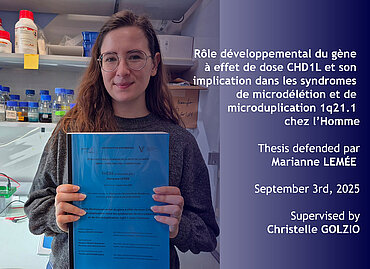Congratulations to Marianne LEMÉE on the acceptance of her thesis!
Her work, supervised by Dr. Christelle Golzio,
is entitled:“Developmental role of the dosage-sensitive gene CHD1L, and its implication in microdeletion and microduplication 1q21.1 syndromes”

Research Summary
Copy number variations (CNVs, deletions/duplications) affecting the distal 1q21.1 region are responsible for syndromes characterized by mirror anthropometric features and neurodevelopmental disorders (NDD). The contribution of genes within this region to the 1q21.1 syndromes remains poorly understood. In vivo modulation of the 1q21.1 distal gene expression identified CHD1L, a chromatin remodeler, as responsible for the observed mirror phenotypes.
Investigation of the developmental role of CHD1L revealed its interaction with key transcription factors and major protein complexes involved in neurodevelopment. This remodeler regulates the expression of genes implicated in neurogenesis, body size regulation, and urogenital system development. Moreover, our findings suggest the existence of a CHD1L-associated disorder with variable expressivity and incomplete penetrance.
Deciphering the genetics of pathogenic CNV enhances our understanding of NDD and helps identify promising avenues for improved diagnosis and better patient quality of life.
Here is the BioRxiv link to my main publication from my thesis, which is now accepted in the Journal Nucleic Acids Research: https://doi.org/10.1101/2025.02.18.638841.
Skills acquired at IGBMC
I acquired a wide range of techniques to successfully carry out my research, particularly working with zebrafish and human induced pluripotent stem cells, which I found especially rewarding. I also learned to share my work internationally through oral presentations and by writing publications.
Life at IGBMC
I appreciated the scientific diversity of the institute. I also valued the opportunities to discover and meet researchers on an international scale, thanks to the many seminars offered. I particularly enjoyed the freedom given to students to organize symposia according to their interests and those of the institute. The environment, as well as the location of the institute, is also very pleasant!
Collaboration
I had the opportunity to collaborate with various internal and external teams, including those of Christophe Romier (IGBMC), Marta Biagioli (University of Trento), Maja Jagodic (Karolinska Institute), and Alexandre Reymond (University of Lausanne). These collaborations were both highly educational and a true pleasure.
Funding and partners
I was initially funded by The IMCBio Graduate School and later by the Fondation de France, whom I thank for their support.
Future projects
I am about to settle in Germany for a postdoctoral position that will allow me to further develop my bioinformatics skills and continue my research in the field of neurogenetics.
